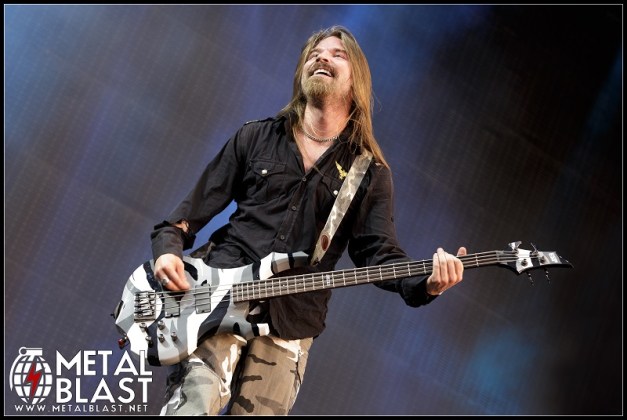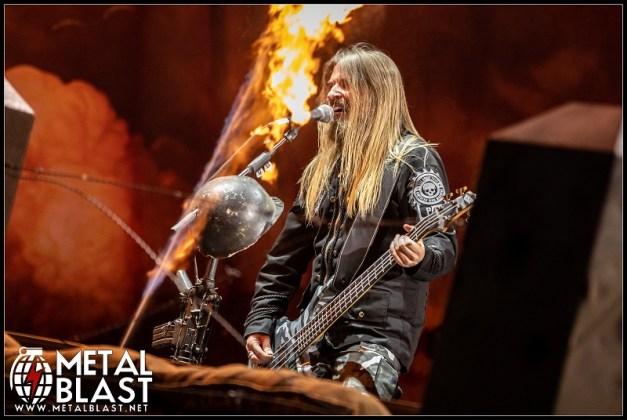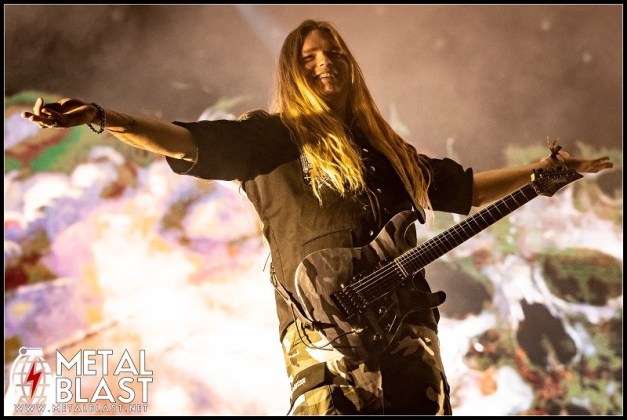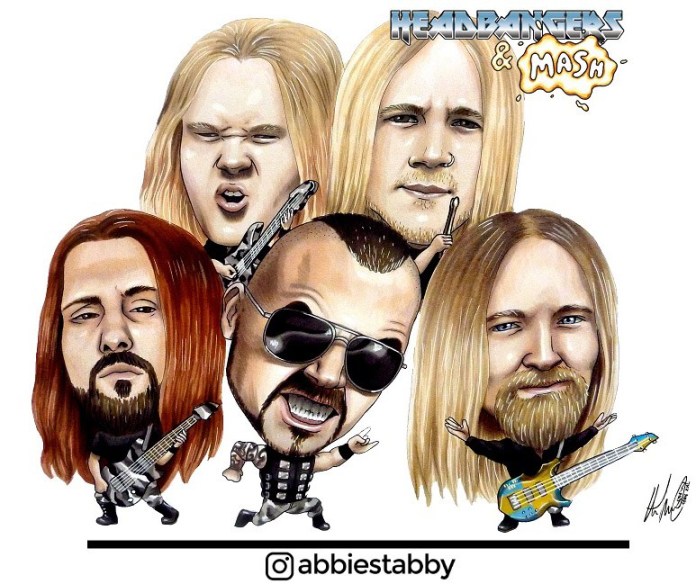
We were just a metal band, and then we also became educators.
I meet with Pär in Amsterdam, during his press tour for the release of The Great War. We fill the time with small-talk as I get my recorder started. I’m his last interview before lunch, so I know that we will probably talk well beyond our allotted time . He casually mentions that I’m one out of 400 scheduled interviews.
“And that’s only Europe! I don’t know how many it’ll be for the US and Asia. It’s 5 weeks of this, non-stop. For The Last Stand I did 350 interviews for Europe, but spread out throughout 12 months. And now it’ll be 400 in one month. It’s a lot so, for a whole month I basically don’t do anything else. It’s a new city every day. Today I’m in Amsterdam, tomorrow in Brussels, yesterday in Warsaw, before that I was in Stuttgart, Berlin… I’m really excited about it, because just a few years ago nobody really wanted to talk to us.”

There’s no denying that interest in Sabaton has increased, as the band continues to reach higher levels of popularity. Carolus Rex, their 2012 album devoted to the Swedish Empire and Charles XII, has been certified quadruple Platinum in Sweden, and they continuously play sold-out shows all over the world. And yet, despite the hard work that comes with running such a successful band, Sabaton seem to continuously become involved with more and more projects, and to play a bigger role in the Swedish music scene.
“Today we’re not just a band with a new album. We also have a Sabaton History Channel focused on the historical aspect of our music, and on all of the many stories behind it. We also have the Sabaton Open Air Festival, which has been going on for more than 10 years, and which has grown from being a one-day indoor event into the second biggest rock festival in all of Sweden. We also have the Sabaton Cruise, which has also going on for 10 years, and which we recently moved to a bigger ship (which we call the “Sabaton Battleship”).
I also love to help young bands. Nowadays it’s really funny to see that in our little town of Falun, where there were no metal bands to speak of when we started, there are now four bands signed to Nuclear Blast, as well as two other bands that are signed to other major record labels. We’ve inspired and helped a lot of bands.”
For a band whose historic theme started after Pär and Joakim watched Saving Private Ryan, their own personal interest has only increased with time. While the music continues to be the driving force, they seem more aware of their role in making their audience aware of the history behind the music.
“The more you read about history the more interested you get. Now, for the first time in our 20-year history, in 15 years of singing about this topic, people can actually learn about history with us, thanks to our Sabaton History Channel, because it is proper education.
Sabaton became something different when we launched the channel in February. We got a new purpose. Only a few people have really understood how important and big it is for a band to do something like this. Until February we were just a metal band, and then we also became educators. I’m very proud of this.
It’s been 15 years since we first had the idea of making a documentary. Having spent that much time thinking about doing this, without ever coming up with good reasons against it… well, it must be a good thing! This is probably why we also see such overwhelming support from the fans on our channel. I can understand that there are small little things that people can complain about, or that people might be concerned that we put too much effort into this channel, and don’t spend enough time writing new songs or touring… but we have time to do both.”
“Already 15 years ago, on the booklet of Primo Victoria, we wrote some notes explaining what the songs were about. Even then we knew that we wanted to make the whole project even bigger.
In 2015 I went to Berlin to film for Indy Neidell, who’d eventually become the host of the Sabaton History Channel, and who was involved with a different program at the time. I joined him to talk about Sabaton’s relationship to WWI, and I really liked the format of his show. The idea grew in me that this was the format that we wanted to use, although we’d need to have the twist of connecting it to our music, so as to make it attractive not only for history-buffs, but also Sabaton fans.
This idea grew over time, and when we knew that we were going to make an album about WWI, I called Indy to know if, since he’s a historian, he’d like to assist us with some of the research. After he agreed I told him about the idea of the Sabaton History Channel, and he got super excited about it, and came over to start discussing the project. It took 8 months until we launched the first episode, as we had many, many ideas . Nobody has ever done something like this, so we had to invent the format.
I had a million ideas about what we could do with the channel, and it was one of our producers who told me to slow down and to do everything step-by-step. First, we had to launch, and to make it successful enough to get us enough subscribers for us to decide whether we wanted to continue with it or not. At first we had two main objectives: We had to launch before we announced the new album; and we had to reach 100,000 subscribers. Now that we’ve passed that number, we’re already thinking about improving the format.”
In its short life, the Sabaton History Channel has done pretty well for itself. They’ve produced over 30 videos, all of which are around 15-minutes, and work with a team of 3 historians in the development of each episode. The number, the content, and the size of each video are all evidence of Sabaton‘s ambition, trying to create good and engaging educational content.
While many might scoff at the idea of a heavy metal band educating anyone, the fact remains that history books are not exactly flying off the shelves. Because of this, a good way to get people engaged and interested in history is by reaching out in a format that works for them. Intellectual elitism, restricting education to traditional means, only results in education reaching less people. Sabaton‘s channel can really be the first step into getting people interested enough to learn more.
“Most people probably wouldn’t be interested in reading a book about these events. If you’d ask me five years ago if I thought that it’s important to educate people in history, I probably would have said yes, but that it wasn’t my job to do it. Nowadays I feel that I can actually do this.”
Whenever history is being discussed, it’s a cliché to quote George Santayana‘s famous dictum of “those who do not remember the past are condemned to repeat it.” I guess that Pär has heard it enough times that he almost sounds defensive when, unprompted, he dismisses the idea of Sabaton‘s music playing some larger role in the making of history.
“I sometimes get asked if I think that teaching history can be useful to prevent future wars, because then we won’t want to repeat history. No, I don’t think so. That’s not gonna happen. But will it make Sabaton fans not want to go to war? Well, I think a lot of our fans probably wouldn’t go to war for other reasons. I mean, I wouldn’t go to war unless war really comes to me. I don’t know anyone who could, for example, convince me to join the Swedish army to invade Finland or some other country [laughs] That’s just not gonna happen.”

For Sabaton, whose entire discography deals with war, it is common to be accused of celebrating war, or to glorify some of the participants. Some people accused them of being nazis, while others accuse them of supporting communists. Many seem unable (or unwilling) to understand that theirs is not a political goal. They just want to tell stories about these epic battles with their music and, hopefully, in the process, make people want to learn more about them.
“We are talking about history in the same way that a museum, a book or a movie would. We just try to make the topic attractive in a different way. You can’t just talk about history to everyone, because different people have different interests, and different ways in which they like to acquire information. Some might go to museums, some might read a book, and others might listen to a heavy metal song. You wouldn’t go to a museum dedicated to WWI and say that they should close it down because they glorify or encourage war. You’d have to be out of your mind! They’d laugh you out of the museum! It’s the same if somebody complains to me about Sabaton.
If people are trying to condemn history, or to censor history, that’s a very dangerous thing. That’s much more dangerous than to simply talk about history, even if done from the wrong side.”
Pär has good reasons to be concerned about the criminalization of history. Many countries spend enormous resources ensuring that only type of history is studied and promoted, usually to maintain a certain political status quo. Russia, for example, has engaged many in times in this behavior, trying to deny or minimize the collaboration of the USSR with the Third Reich. Something similar happens in China, where totalitarian policies have resulted in the censorship of any mentions of the Tiananmen Square protests, and the massacre of the protestors perpetrated by the Chinese army. Similarly, North Korea, in true Orwellian fashion, have also engaged in deletion of history, eliminating the mention of people who ended up on the wrong side of the Party.

Considering all the battles and wars that have taken place since WWI, Sabaton‘s desire to look back and that specific conflict might seem strange. Due to the many horrors that took place there, history lessons often focus on World War II, devoting much less attention to the First World War. This despite the fact that the consequences of WWI were so massive, that they are felt to this day. It ended with a treaty that could only lead to a new war, and it marked the first grand-scale use of weapons capable of creating absolute destruction. It was the beginning of a new era in battlefield brutality.
“I often find WWI more interesting than WWII. Because of the sheer brutality, the psychology and the darkness of it, trench warfare is such a scary and horrible thing, that it just seemed like a subject that was meant to create interesting things. It’s absolutely horrible! The development of war after WWI somehow saw less hand-to-hand fighting, less battles in close-quarters, whereas the closer you are to your enemy the more real the feeling of fighting really is.
I find it very interesting that the current world map is very much shaped by WWI, and the end of the age of empires. There’s also a lot of stuff still left to discover about it. Growing up in Sweden, basically we knew that there was a First World War because it had a sequel [laughs]. The conflict was very much away from Sweden, with very few Swedes actually fighting in that war. In school we had to read “All Quiet on the Western Front,” but we barely reflected on it. It was just to get WWI out of the way, basically.
Pär‘s mention of All Quiet on the Western Front is interesting, and I can’t help but wonder if the book played a role in his way of looking at war from a soldier’s perspective. Written by Erich Maria Remarque, a WWI veteran, this 1928 book moved away from traditional nationalistic depictions of wartime heroism, focusing instead on how horrible it was to actually participate in trench warfare, and in how dehumanizing war can be. Despite being a commercial success upon publication, the book was heavily criticized precisely for showing the dark aspects of war; some even called it treasonous.
The book was part of a new trend in the way in which artists portrayed war, presenting a more realistic and less sanitized version of the battlefield. I’ve always seen Sabaton‘s work as being part of that trend, even if their depictions take the form of heavy metal songs. While they pay their respects to troops who acted heroically in battle, they also make sure to always remind us of the fact that war is hell.
“That’s really what I wanted to represent with this album; that war is horrible.
You can call war a lot of things, but you don’t put “great” and “war” next to each other. You can call it the “large war,” the “grand war,” the “big war,” “the evil war,” or whatever you want, but you don’t call it the Great War. It was this name that I first found so interesting, and which I really wanted to put in. I don’t think that the soldiers at the time even knew that they were supposed to be fighting in the Great War. That’s the meaning of the song “Great War,”, and why it’s not called “THE Great War.”
“Great War” is actually the song that connects with me the most. There is a double meaning there. First, there’s the question of what’s so good about this war; behind that, there’s a story that I found about Paschendale, where 3 brothers were fighting. In the end the only meaning of their own struggle was that their mother should not get a letter saying that all three had died. So the last one of them had to keep in mind not just his duties as a soldier, but also that he couldn’t die, not for himself, but for his mom. [Note: That anecdote might be refer to the Newlove brothers, or to the Seabrook brothers]”

Something that explains Sabaton‘s wide appeal is that they often focus their attention on lesser known events or perspectives. They have songs about soldiers from Scotland, Japan, Israel, Brazil, Serbia, and many other countries. Fans from those countries often feel especially connected to the band.
“There’s an interesting story about Serbia, actually. I mentioned it to the guys in the band (at least the newest ones) when they were wondering why we’d sometimes play in countries where there wasn’t that much of a following. I told them how the world changes. When Sabaton was formed it would have been absolutely impossible for us to play in Serbia, because there was a war going on. And yet, one of our very first fans was a girl who lived in Serbia. I sent her the demo, and she told me how great it would be to see us play one day. We knew that we couldn’t make it happen then, so for someone like me, who had never played a show outside of my own region, the idea of one day playing in Serbia simply didn’t seem realistic. And yet, Serbia is now in peace, and when we played there in front of 3,000 Serbians, it was the best show of the whole tour. It was the absolutely best crowd.
You can really see how the world changes all the time. Early on, the country where we had the most fans in all of South America, the country that I knew had to be our first show ever in South America, was Venezuela. That doesn’t seem realistic anymore. Nowadays nobody can play in Venezuela. It’s impossible. No artist can step in there, there’s no money in it, producers wouldn’t even be able to pay for a hotel room. 15 years ago, however, it really seemed like the most realistic destination. Meanwhile, we saw the rising importance of Paraguay as a place where our fans come from, and when we came to play there, we also got to see the end of it. They told us that on the same night that we were performing there was a change of government, or something like that, so that they probably wouldn’t see another metal show for a while. That show was fully packed.
The world will continue to change during our time. We will see new things. A few years ago the Chinese market was completely uninteresting; now distribution works pretty well there. They’re very digital, very advanced. Our streaming services pale in comparison to what they’re using there.
Discussing the Chinese and Latin American markets it’s obvious that Sabaton have become a very complex machine. A lot of planning and preparation is necessary to keep the whole thing running. Pär seems to be up for that sacrifice, although he knows it can be tough.
“We need to be much more strict. We are responsible for a lot of people now. It’s not just the guys in the band, we have a lot of people who work full-time for us, and they need to know what they’re doing, what they’re working on, and they need to know that they have a secure job so that they can go on with their lives. For me this is good. I like that we are becoming more and more organized. Joakim maybe isn’t so happy about it [laughs] I’ll say to him “OK, next album will be released on this date, it needs to be recorded before this other date, we start recording on that date, it’s gonna go like this, and this…” etc. It can seem a bit rigid, because I’ll him that we have a certain time to write the songs, and so he’s like “What if we need more time?!” Well, we don’t have more time. It is what it is. But this is necessary for everybody, including himself, in order to be able to plan his own life.”

Despite their popularity, the path to success was a long one. Although being recognized as good musicians is definitely an important part in an artist’s life, success also includes some financial independence. While fans paid attention from the very beginning, Pär‘s first benchmark of success, being able to live from what they made with the band, took a while longer.
“I think it was just before Carolus Rex. So it took us 10 years for all of us to be paying our bills from what we made with the music. We’ve always invested a lot in the band. Sabaton shows often costed almost as much as we were making, and sometimes even more. Early on we still had a big production. Our ambition was really high.
On our first “real” concert we didn’t have any pyrotechnics, but on the second one we did. That concert costed way more in pyrotechnics than what we made from the show, including the sale of merch. We were losing money, so people said that we were crazy because every single Euro was important, but it was important for us to put up a good show. It made people talk about us; we were the “crazy” band that was going wild on stage, thinking that we were bigger than we were, or at least trying to look bigger than we were.
In 2004, when we finished recording “Primo Victoria”, I knew that we had potential. I thought that we had created a great song that was not just something that would make people say “yeah, it’s a good song;” it was a song that people who had no connection to us would listen to and say “this is the best song that I’ve ever heard in my life.” Creating that was a threshold that we wanted to break, but it was also a motivation to push further. With the release of Carolus Rex, I knew that we had created something special. I knew that we had created an album for the history books. It is the biggest rock album in Sweden ever!
When we were writing and recording it there were a lot of people telling us that it would not be successful, that heavy metal in Swedish wouldn’t work. Some people told us that singing about that topic wouldn’t work, because it might even be too controversial to sing about Swedish history. A lot of people asked us if we really thought that we’d have success singing about a 300-year old Swedish king, and about whom nobody cares anymore. I said that we’d do all of that, and that we’d re-write rock history in Sweden with that album.
I was really proud to prove people wrong. So many people had no clue; they knew that the album was doing very well, but when we said that it was 4 times Platinum… I think it’s 5 times now! It’s constantly in the charts; it’s always being played. Since its release, it has always been in the top-20 rock charts. It has changed Sweden a lot.
If you take these sales, and you account for the difference in overall record sales that exist with the 80s and 90s, it might be one of the top 3 record albums ever in Sweden. In any genre.
Continuing their musical onslaught on all fronts, Sabaton‘s music have also been used in video games. Of course, always in the genre of war games.
“We were involved with World of Tanks. That same company, who also makes World of Warships, helped us with our Bismarck video. Some of our songs are also in the soundtrack for Hearts of Iron IV. There was also a game in the Czech republic with which we wanted to participate more. It’s a game called Kingdom Come; it’s not focused on the same type of history that we focus on, but on the history of Bohemia, the current Czech republic. Since Joakim is part Czech, we liked the game, and the developers are huge fans of us, we were invited to their studios. We didn’t have any songs that connected to it… so we did a cover of Manowar‘s “Kingdom Come” [laughs]”
As one of Sweden’s most successful musical exports, I was sure that they had to have been approached to participate in Eurovision. Finnish heavy metal band Lordi had famously won at the 2006 Eurovision in Greece, so perhaps it wasn’t so farfetched to imagine them there, representing Sweden.
“We’ve been approached many times. We said no every time [laughs].
We have no intention to be part of it. Only once we were excited about the idea of doing it, because we had written the song “Carolus Rex,” and that year the Eurovision finals would take place in Sweden. We thought that if there was ever a time to do it, it would be then, singing that song, in Swedish, at that place. We were encouraged by that thought… but we said no.
It’s a long story but, basically, we didn’t want to be a part of it. We do so many other things that are closer to us, and I rather involve the band in the Sabaton History Channel, or cooperating with a video game, or doing something that is closer to our hearts than Eurovision.”
Great War is out now through Nuclear Blast.


